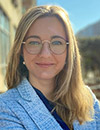PM Emcee
 |
| |
| |
Anjul Loiacono
VP Quantum Dynamics Platforms
Infleqtion (United States) |
|
|
Anjul Loiacono is the VP of Quantum Dynamics Platforms at Infleqtion. Previous to joining Infleqtion, Anjul spent 12 years at Thorlabs where she oversaw the development and release of their flagship Optical Coherence Tomography product line, developed corporate strategies, managed strategic partnerships, and completed several acquisitions worldwide. Anjul received her Ph.D. from Duke University, serves on the Optica Corporate Engagement Council and judging panels for SPIE Prism Awards and Startup Challenge, and is Chair of the Enabling Technologies Technology Advisory Committee for the Quantum Economic Development Consortium (QED-C).
1:30 - 1:40 PM:
Introductory remarks
 |
| |
| |
Philip Makotyn
Executive Director
CUbit Quantum Initiative, Univ. of Colorado Boulder (United States) |
|
|
Philip Makotyn obtained his PhD in Physics from Univ. of Colorado Boulder in 2014 as part of a joint research group led by Eric Cornell and Deborah Jin at JILA, and in May of 2021 he was named executive director of the campus’s CUbit Quantum Initiative. Maximizing the benefits of an interdisciplinary approach to research and education in quantum information science and technology, the CUbit Quantum Initiative coordinates quantum activities at CU Boulder, catalyzing focus areas and research centers across the university. In his previous roles, Phil worked as a research scientist for Lockheed Martin and Honeywell Quantum Solutions before becoming a senior quantum marketing manager at Honeywell. In this role, Phil built key aspects of the company's commercial engagements and grew relationships with a wide range of academic, government and industry partners across the globe in preparation to launch Honeywell's quantum computers.
1:40 - 1:55 PM:
Building a quantum engineering undergraduate program
 |
| |
| |
Lincoln D. Carr
Professor, Quantum Engineering Program
Colorado School of Mines (United States) |
|
|
A roadmap is provided for building a quantum engineering education program to satisfy U.S. national and international workforce needs. The rapidly growing quantum information science and engineering (QISE) industry will require both quantum-aware and quantum-proficient engineers at the bachelor's level. A workshop of 480 QISE researchers from across academia, government, industry, and national laboratories was convened to draw on best practices; representative authors developed this roadmap. Findings: 1) For quantum-aware engineers, design of a first quantum engineering course, accessible to all STEM students, is described; 2) for the education and training of quantum-proficient engineers, both a quantum engineering minor accessible to all STEM majors, and a quantum track directly integrated into individual engineering majors are detailed, requiring only three to four newly developed courses complementing existing STEM classes; 3) a conceptual QISE course for implementation at any postsecondary institution, including community colleges and military schools, is delineated; 4) QISE presents extraordinary opportunities to work toward rectifying issues of inclusivity and equity that continue to be pervasive within engineering. A plan to do so is presented, as well as how quantum engineering education offers an excellent set of education research opportunities; and 5) a hands-on training plan on quantum hardware is outlined, a key component of any quantum engineering program, with a variety of technologies, including optics, atoms and ions, cryogenic and solid-state technologies, nanofabrication, and control and readout electronics.
Lincoln Carr received his B.A. from the University of California, Berkeley, and his M.S. and Ph.D. in Physics from the University of Washington, Seattle. He is an IEEE Senior Member, a Fellow of the American Physical Society, a Kavli Fellow and a Jefferson Science Fellow of the National Academies of Sciences, Engineering, and Medicine, an Alexander von Humboldt Fellow, a National Science Foundation Distinguished International Fellow, and an Embassy Science Fellow of the U.S. Department of State. He is an Honors Faculty Fellow and Payne Institute for Public Policy Fellow at the Colorado School of Mines, where he is a Professor in the Quantum Engineering Program and the Physics Department, and a Graduate Faculty Advisor in the Applied Mathematics and Statistics Department. His research brings together complexity theory, quantum information science and engineering, education, condensed-matter physics, atomic, molecular, and optical physics, nonlinear dynamics, computational physics, and applied mathematics, pushing the frontiers of complexity theory in the quantum world. To date he has mentored over 100 students in research, received over 10 million in grant funding and fellowships, and published over 160 articles and books with over 16,000 citations. He has taught for over 25 years in both the sciences and the humanities on topics ranging from quantum physics to revolution in science, literature, and society to science and engineering diplomacy.
1:55 - 2:10 PM:
Discovering and diversifying quantum talent
 |
| |
| |
Connor Teague
CEO and President
Quantum Futures (United States) |
|
|
The opportunity to diversify our workforce is now! With the awareness of quantum computing increasing, it’s important to understand how to discover talent from other industries, while setting the foundations to attract and retain a diverse workforce before it’s too late. I will be discussing topics around how not hiring the right leader will affect your company in diversifying talent, the importance of bringing networks with you, non-quantum leaders, and more!
Connor Teague is the President and CEO at Quantum Futures. Connor has a proven track record of supporting quantum computing businesses to grow and diversify their workforce. His broad industry relationships and expertise has helped quantum organizations reach their business goals through the development and retention of talent.
2:10 - 2:25 PM:
Takeaways from training 20,000 students in quantum
 |
| |
| |
Kiera Peltz
Founder and Executive Director
Qubit by Qubit, The Coding School (United States) |
|
|
Over the past several years, Qubit by Qubit, a nonprofit initiative, has trained over 20,000 students from around the world in quantum computing, including middle and high school students and educators, university students and faculty, and current members of the workforce. In this talk, I'll share what we've learned from training thousands of students from different backgrounds, best practices for making quantum education accessible and inclusive, and recommendations for building a quantum talent pipeline.
Kiera Peltz is the Executive Director of Qubit by Qubit (QxQ), a nonprofit initiative focused on training the future diverse quantum workforce. To date, QxQ has trained over 20,000 students and educators from 125 countries in quantum. With diversity and inclusion at the heart of QxQ's mission, over 55% of students are from historically underrepresented backgrounds in STEM. Kiera is a graduate of Brown University and holds master's degrees from University of Cambridge and Tsinghua University. She is a Gates-Cambridge and Schwarzman Scholar.
2:25 - 2:40 PM:
Education and Training in Photonics Quantum Sciences and Technologies: peer-reviewed reports from the global community
 |
| |
| |
Matthew Posner
Workforce and Photonics Education Director
Optonique (Canada) |
|
|
Quantum sciences and technologies bring new challenges and opportunities to educators and trainers in academia, industry, and non-profits in optics and photonics. Based on a set of open-access and peer-reviewed publications, I will highlight advances in education and training methods applied to photonics-based quantum sciences and technologies. The presentation will describe methods for designing, implementing and evaluating engagement with industry professionals, policy makers, artists, and the public, as well as students in grades K through 12, undergraduate and postgraduate levels.
Matthew Posner is Director of Workforce and Photonics Education at Optonique, the industry cluster for Optics and Photonics in Quebec province, Canada. His expertise is in manufacturing of photonics integrated circuits and components for optoelectronics, sensing and quantum applications, as well as pedagogy and program management for technical training and professional development. He is an active science communicator and is passionate about “getting science out of the lab”. He is a member of SPIE, a Guest Editor of the Special Section on “Education and Training in Quantum Sciences and Technologies”, published in SPIE Optical Engineering, Vol. 61, Issue 8a, holds advanced degrees in electronics and optoelectronics.
2:40 - 3:15 PM:
Panel Discussion on quantum workforce development
Moderator
| |
| |
Philip Makotyn
Executive Director
CUbit Quantum Initiative, Univ. of Colorado Boulder (United States) |
|
Panelists
| |
| |
Lincoln D. Carr
Associate Professor
Colorado School of Mines (United States) |
|
| |
| |
Connor Teague
President, Quantum Computing Talent Partner
Quantum Futures (United States) |
|
| |
| |
Kiera Peltz
Founder and Executive Director
Qubit by Qubit, The Coding School (United States) |
|
| |
| |
Matthew Posner
Workforce and Photonics Education Director
Optonique (Canada) |
|





